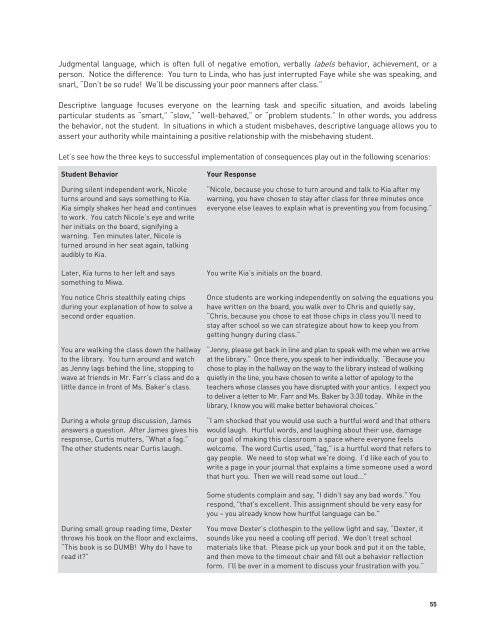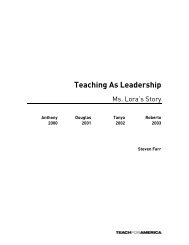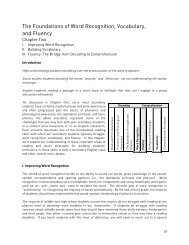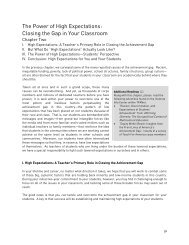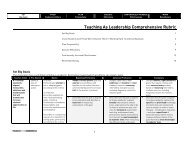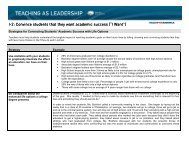Responding to Misbehavior - Teaching As Leadership
Responding to Misbehavior - Teaching As Leadership
Responding to Misbehavior - Teaching As Leadership
You also want an ePaper? Increase the reach of your titles
YUMPU automatically turns print PDFs into web optimized ePapers that Google loves.
Judgmental language, which is often full of negative emotion, verbally labels behavior, achievement, or a<br />
person. Notice the difference: You turn <strong>to</strong> Linda, who has just interrupted Faye while she was speaking, and<br />
snarl, “Don’t be so rude! We’ll be discussing your poor manners after class.”<br />
Descriptive language focuses everyone on the learning task and specific situation, and avoids labeling<br />
particular students as “smart,” “slow,” “well-behaved,” or “problem students.” In other words, you address<br />
the behavior, not the student. In situations in which a student misbehaves, descriptive language allows you <strong>to</strong><br />
assert your authority while maintaining a positive relationship with the misbehaving student.<br />
Let’s see how the three keys <strong>to</strong> successful implementation of consequences play out in the following scenarios:<br />
Student Behavior Your Response<br />
During silent independent work, Nicole<br />
turns around and says something <strong>to</strong> Kia.<br />
Kia simply shakes her head and continues<br />
<strong>to</strong> work. You catch Nicole’s eye and write<br />
her initials on the board, signifying a<br />
warning. Ten minutes later, Nicole is<br />
turned around in her seat again, talking<br />
audibly <strong>to</strong> Kia.<br />
Later, Kia turns <strong>to</strong> her left and says<br />
something <strong>to</strong> Miwa.<br />
You notice Chris stealthily eating chips<br />
during your explanation of how <strong>to</strong> solve a<br />
second order equation.<br />
You are walking the class down the hallway<br />
<strong>to</strong> the library. You turn around and watch<br />
as Jenny lags behind the line, s<strong>to</strong>pping <strong>to</strong><br />
wave at friends in Mr. Farr’s class and do a<br />
little dance in front of Ms. Baker’s class.<br />
During a whole group discussion, James<br />
answers a question. After James gives his<br />
response, Curtis mutters, “What a fag.”<br />
The other students near Curtis laugh.<br />
During small group reading time, Dexter<br />
throws his book on the floor and exclaims,<br />
“This book is so DUMB! Why do I have <strong>to</strong><br />
read it?”<br />
“Nicole, because you chose <strong>to</strong> turn around and talk <strong>to</strong> Kia after my<br />
warning, you have chosen <strong>to</strong> stay after class for three minutes once<br />
everyone else leaves <strong>to</strong> explain what is preventing you from focusing.”<br />
You write Kia’s initials on the board.<br />
Once students are working independently on solving the equations you<br />
have written on the board, you walk over <strong>to</strong> Chris and quietly say,<br />
“Chris, because you chose <strong>to</strong> eat those chips in class you’ll need <strong>to</strong><br />
stay after school so we can strategize about how <strong>to</strong> keep you from<br />
getting hungry during class.”<br />
“Jenny, please get back in line and plan <strong>to</strong> speak with me when we arrive<br />
at the library.” Once there, you speak <strong>to</strong> her individually. “Because you<br />
chose <strong>to</strong> play in the hallway on the way <strong>to</strong> the library instead of walking<br />
quietly in the line, you have chosen <strong>to</strong> write a letter of apology <strong>to</strong> the<br />
teachers whose classes you have disrupted with your antics. I expect you<br />
<strong>to</strong> deliver a letter <strong>to</strong> Mr. Farr and Ms. Baker by 3:30 <strong>to</strong>day. While in the<br />
library, I know you will make better behavioral choices.”<br />
“I am shocked that you would use such a hurtful word and that others<br />
would laugh. Hurtful words, and laughing about their use, damage<br />
our goal of making this classroom a space where everyone feels<br />
welcome. The word Curtis used, “fag,” is a hurtful word that refers <strong>to</strong><br />
gay people. We need <strong>to</strong> s<strong>to</strong>p what we’re doing. I’d like each of you <strong>to</strong><br />
write a page in your journal that explains a time someone used a word<br />
that hurt you. Then we will read some out loud..."<br />
Some students complain and say, "I didn't say any bad words." You<br />
respond, "that's excellent. This assignment should be very easy for<br />
you – you already know how hurtful language can be."<br />
You move Dexter’s clothespin <strong>to</strong> the yellow light and say, “Dexter, it<br />
sounds like you need a cooling off period. We don’t treat school<br />
materials like that. Please pick up your book and put it on the table,<br />
and then move <strong>to</strong> the timeout chair and fill out a behavior reflection<br />
form. I’ll be over in a moment <strong>to</strong> discuss your frustration with you.”<br />
55


